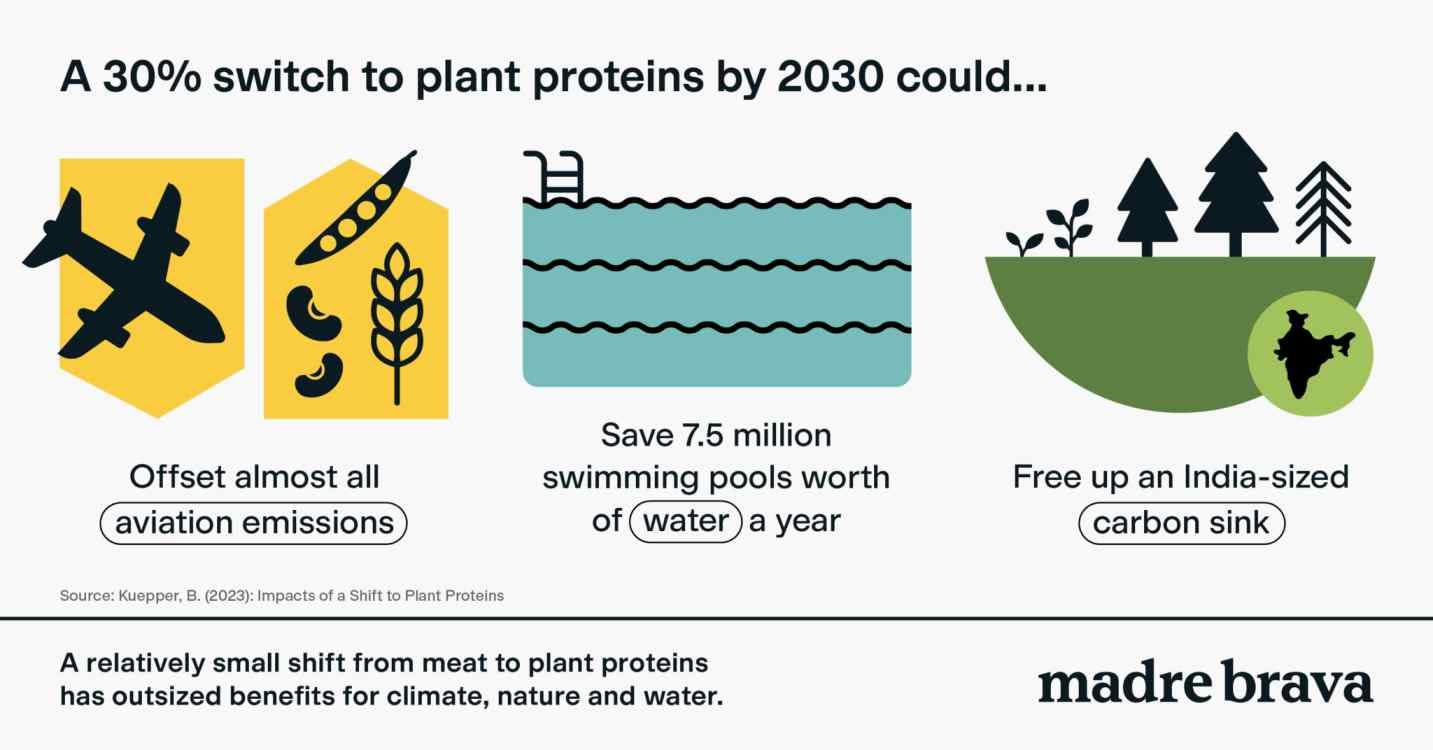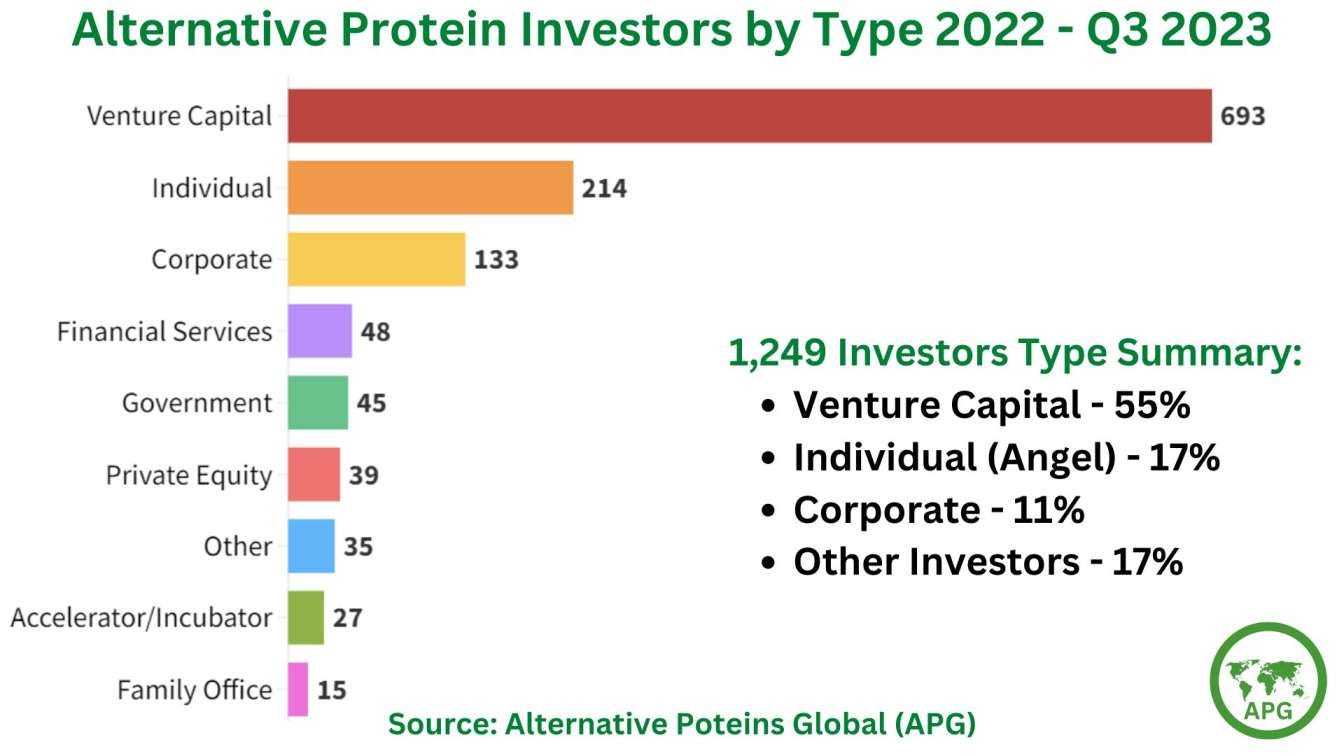Cultivating Meat in Space, Singapore’s Food Tech Supremacy, and WTH Happened to BYND and OTLY?
Also: 30% reduction in meat consumption could do the world a lot of good
BIO BUZZ
🪐 The European Space Agency (ESA) says cultivating meat in space shows “promising” potential
Two independent teams from Germany and the UK have investigated the feasibility of producing cell-based meat in space and have come to similar conclusions, suggesting that it's a viable idea.
ESA is developing technologies to improve bioprocesses and metabolic resource use in space, including closed-loop systems to recover nutrients and recycle waste, which can also benefit cultivated meat production.
The research on cultivating meat in space has the potential to contribute to better meat production methods on Earth and aligns with the broader interest in novel protein sources for astronauts by other space agencies like SpaceX and NASA.
Read full article - vegconomist
🤝 NEOM and BlueNalu have signed an MoU to advance the commercialization, marketing, and distribution of cultivated seafood
Key objectives of the partnership include establishing an incubation and food innovation ecosystem in Saudi Arabia, conducting public education and consumer research, and working with regulatory bodies to facilitate the sale of novel food products.
NEOM recently invested $20 million in BlueNalu to scale the production of cultivated toro.
The partnership represents a significant step towards a more secure and accessible seafood supply in Saudi Arabia, with the goal of accelerating innovative, renewable food solutions through cell-cultured seafood.
Read full article - vegconomist
🏭 ScaleUp Bio has announced its first customers, including Nourish Ingredients
The Singapore-based CDMO provider's collaboration with Australia’s Nourish Ingredients will support significant fermentation capacity and thermal processing for the production of animal-free fat for plant-based meat and other applications.
ScaleUp Bio has also signed Letters of Intent with other companies like C16 Biosciences, Ultimeat, and Allium Bio, emphasizing the growing interest in microbial precision fermentation for food production.
The company's dedicated facilities are in the pre-operational phase, and they are expected to begin full operations in early 2024, contributing to the advancement of the food industry's next revolution.
Read full article - vegconomist
🐟 Nestlé is launching three new vegan white fish products in Europe and Asia to meet the growing demand for sustainable proteins
The products include marine-style crispy fillets and nuggets made with wheat and pea protein, and crispy fish-free fingers made from soy and wheat.
Nestlé emphasises the nutritional benefits of these products, including high protein, low saturated fat, and high fiber content. The European products will have A Nutri-score ratings.
Consumer focus on health is a significant driver in food choices, with surveys showing a shift towards healthier diets and increased interest in alternative proteins.
Read full article - Green Queen
🐶 THE PACK becomes Europe's first plant-based pet food startup to become a certified B Corp
The company's founders have a long-standing passion for addressing the climate crisis and promoting businesses that prioritise the planet.
Being a certified B Corp ensures high standards of environmental performance and transparency for THE PACK, reinforcing its mission-driven and environmentally conscious approach.
THE PACK's sustainability journey includes plastic-free packaging and the launch of FSC certified paper packaging, emphasising their dedication to quality and sustainability in the pet food industry.
Read full blog - THE PACK
💭 Mush Foods CEO on blended meat: “We don’t need the entire world to go vegan to have a positive impact on our food supply and environment.”
Mush Foods, a mycelium meat company, offers a unique approach to blended meat by using a mushroom-derived mycelium protein ingredient to enhance the flavor of conventional meat while reducing the demand for 100% meat products.
Mush Foods aims to halve global meat consumption by providing a more sustainable alternative to purely animal-based meat. Mush believe that not everyone needs to go vegan to make a positive impact on the food supply and the environment.
The company has gained support from investors who are committed to reducing meat consumption for environmental and animal welfare reasons.
“If we are realistic, it is unlikely that 100% of the global population will become vegan. In some countries, meat will remain a symbol of growing personal wealth, and that won’t change.” - Shalom Daniel, CEO of Mush Foods
Read full article - Green Queen
MACRO STUFF
🇸🇬 Singapore is working on a Food Safety and Security Bill to provide greater regulatory clarity for novel foods like cultivated meat
Singapore has established itself as a hub for food tech innovation and alt-protein startups, with a supportive government and a history of granting regulatory approval for cultured meat production.
The proposed bill will consolidate food-related provisions from existing Acts into a single Act, aiming to enhance food safety systems and processes and foster collaboration with industry stakeholders.
The bill aligns with Singapore's 30 by 30 initiative to improve food security by producing 30% of the nation's food by 2030, creating opportunities for alt protein companies.
Read full article - Green Queen
🇹🇼 Taiwan's Food Industry Research and Development Institute (FIRDI) and Ai Zhi Wei collaborate to establish a plant milk R&D center
The center aims to enhance Taiwan's supply chain for plant-based ingredients and explore biotechnology for developing protein-rich, nutritionally enhanced plant-based milk alternatives.
Ai Zhi Wei, a well-known beverage brand in Taiwan, will leverage its industry experience in partnership with FIRDI to create innovative plant-based milk products in response to growing global demand.
Taiwan is actively promoting plant-based initiatives, with government support for startups and grassroots movements advocating for plant-based diets. This includes a climate bill promoting low-carbon diets with a focus on plant-based foods.
Read full article - vegconomist
🎓 GFI unveiled a multi-step training programme for fresh graduates and mid-careerists in Singapore's plant-based meat industry
The program aims to prepare individuals for specific job roles in the plant-based sector, including protein texturization specialists, plant-based meat product specialists, and extrusion specialists.
The goal is to eliminate a bottleneck in the industry and ensure R&D and manufacturing facilities have skilled local employees.
Singapore's food tech sector is thriving, with government support and regulatory advancements making it a leading hub for food innovation.
Read full article - Green Queen
🌱 Replacing 30% of meat consumption with plant-based alternatives could have significant environmental benefits
A 30% reduction in meat consumption could save 728 million tons of CO2e annually, equivalent to global aviation emissions.
It would free up land the size of India and restore it for nature conservation. The switch would save 18.9 cubic km of water, equivalent to 7.5 million Olympic-sized swimming pools per year.
This reduction would also spare the lives of 420 million pigs, 22 billion chickens, and 100 million cows in the US.
Read full article - Green Queen
💥 Oghma Partners predicts a “shake-out” for cultivated meat “similar to plant-based meat” sector and consolidation amongst players
Interest in cultivated meat is rapidly growing as the industry becomes economically viable. The investment in cultivated meat startups surged from $176 million in 2016–2019 to over $2.15 billion in 2020–2021.
A small proportion of companies, such as UPSIDE Foods, have received the majority of funding, and the top five companies account for 46.9% of the total funds raised.
Only the US and Singapore have approved the sale of cultivated meat, with US approval being particularly significant due to its large consumer market. UK and the Netherlands, are showing promising signs of considering approval.
Read full article - vegconomist
📊 ADM highlights culinary trends including “plant-forward” for EMEA region
Culinary trends in the EMEA region are driven by global influences, a desire for premiumization and convenience, a blend of classic comfort with modern twists, and a focus on plant-forward options.
The wealth of regional cuisine is expanding due to increased access to global news and events, leading to new culinary explorations and experimentation.
Consumers in the EMEA region are increasingly seeking premium and convenient dining experiences, embracing familiar flavors presented in innovative ways, and showing a growing interest in plant-based options to meet diverse dietary needs.
Read full article - vegconomist
New here? Devour the free subscription and join a list of founders, investors, and biotech enthusiasts leading the food revolution!
BIO BUCKS
💸 Triplebar has secured $20M to expand its technology platform for optimising biomanufacturing
The California-based startup's technology combines microfluidics and rapid testing with AI and machine learning to optimize biomanufacturing processes using microbial or animal cells. This enables the production of various products, from low-cost animal proteins to therapeutic biologic drugs.
The company's screening platform acts as a "microprocessor for biology" by miniaturizing and accelerating evolution, allowing them to screen millions of mutations and optimize strains at a rapid pace.
Triplebar is open to collaboration and partnerships to help companies develop host microorganisms or optimize existing production strains. This funding will enable the company to expand its partnerships and pursue various commercial models.
Read full article - AgFunder
🍄 Tupu secured $3.2M in seed funding to advance its decentralised urban mushroom farming system
The German agtech company specialises in growing organic gourmet mushrooms directly in cities, catering to a range of customers, including renowned chefs and wholesalers.
The company's highly advanced farming technology, including harvesting robots and AI-driven systems, improves yields, increases spatial efficiency, and combats labour shortages.
Tupu already supplies >3 tonnes of mushrooms per month. Tupu aims to make organic, locally produced, and fresh food accessible to everyone, addressing food insecurity and environmental concerns.
Read full article - vegconomist
📉 Beyond Meat is planning a 19% reduction in its global non-production workforce due to weaker-than-expected Q3 sales
The company expects lower Q3 revenues of approximately $75 million, with a loss of $7-$8 million, and a full-year net revenue prediction of $330-$340 million, which is significantly lower than the previous year.
Three main factors contributing to the revenue decline are weaker US retail and food service sales, less effective promotions, and weaker sales of core products compared to non-core products.
Despite challenges in the US, Beyond Meat has seen better performance in Europe, partly attributed to partnerships with major food service chains. The company plans operational changes, including reviewing its global operations, pricing strategy, and focusing on regions with revenue growth.
Read full article - vegconomist
💰 VisVires New Protein has rebranded as Clay Capital and closed its second fund of $145M
Clay Capital will focus on backing startups in Europe, Israel, and Asia that use technology to address issues in the food system.
The fund's initial investments include companies like Toopi, WeedOUT, and Cook-e, with backing from institutional investors.
Clay Capital aims to serve as a bridge between the Asian and European markets and highlights the adaptability and innovation of European startups in the agrifood sector.
Read full article - AgFunder
🌱 The global plant-based food market is expected to reach a value of $54.15B by 2023, with a CAGR of 17.60% from 2022 to 2027
The plant-based food market is segmented into four main categories: dairy, meat, eggs, and others, with dairy being the largest segment and plant-based eggs expected to show the highest growth.
Supermarkets and hypermarkets currently dominate distribution, but online sales are predicted to exhibit the highest growth rate, offering convenience and comfort to consumers.
Factors driving the growth of the plant-based food market include the rise in the vegan population, increased grocery e-commerce sales, favourable government initiatives, and the emergence of flexitarian consumers. Challenges include the comparatively higher price range and consumer preferences for animal-based products.
Read report - Research and Markets
SOCIAL FEAST
❎ Is regenerative agriculture just greenwashing by the food industry?
At the Transform Food summit, the food industry leaders discussed regenerative agriculture without providing a clear definition or specific metrics for its benefits, leading to confusion about its practical meaning and impact.
Discussions primarily focused on marginal improvements in areas like "climate neutral" cows and crop practices, without addressing more critical issues such as reducing meat and dairy production or diversifying the food system.
There is a need for specific targets to reduce emissions, conserve water, restore biodiversity, reduce waterways pollution, and a commitment to pay farmers for growing healthy and sustainable foods. Without such clarity and accountability, the potential transformation from regenerative agriculture may be inadequate.
Read full post on LinkedIn - Irina Gerry
💰 9 types of investors that are actively investing in alt protein
Read full post on LinkedIn - Nicholas Dahl
🌏 Why we can’t copy-paste best practices in food regulation across different countries
Protein diversification involves regulating novel foods and alternative proteins through general or specific food laws, with specific regulations leading to more rigorous risk assessments.
Jurisdictions have varying approaches to regulatory approval systems, leading to differences in complexity and length.
Copy-pasting best practices from one jurisdiction to another may not be a practical solution due to cultural, economic, societal, historical, and political differences.
Read full post on LinkedIn - Mathilde Do Chi
Got a taste for this newsletter? Dish it out to your friends!👇🏾
EAR FOOD
🎙 What happened to the Beyond Meat and Oatly stocks?
Show: The Plantbased Business Hour
Host: Elysabeth Alfano
Guest: Dr. Sasha Goodman, Chief Investment Officer of VegTech Invest
Beyond Meat and Oatly, once considered leaders in the future of food, have seen their stock prices decline significantly.
These companies were initially valued like tech stocks but are consumer staple stocks, which led to initial high price-to-sales ratios. Now, their valuations have come down to more reasonable levels.
Both Beyond Meat and Oatly were focused on growth and capital expenditures (CAPEX), which made them unprofitable. However, they are now shifting their focus towards profitability.
Analysts struggle to understand and evaluate unprofitable companies, leading to uncertainty and potential sell-offs. Profitability is a key factor for analysts and investors.
THAT’S ALL FOR THIS WEEK!
Take care, and have an awesome week! 🙌🏾
Are you new here?
Know any other geeks who would dig this newsletter?








